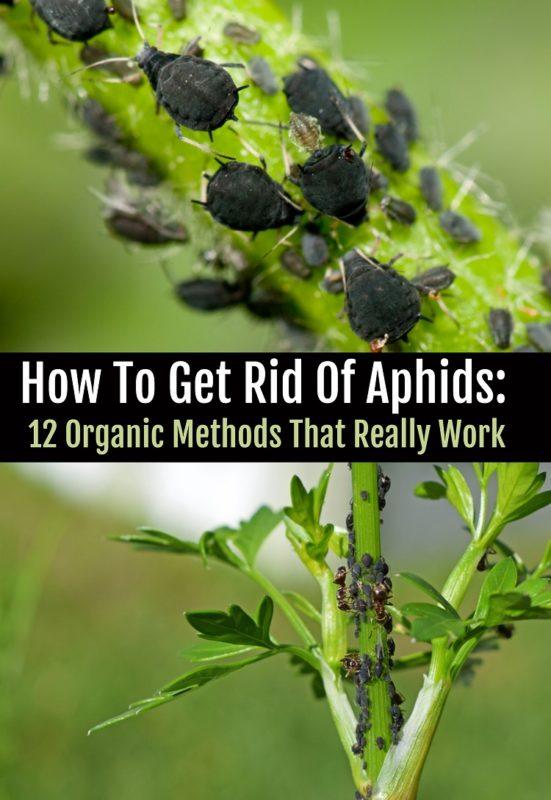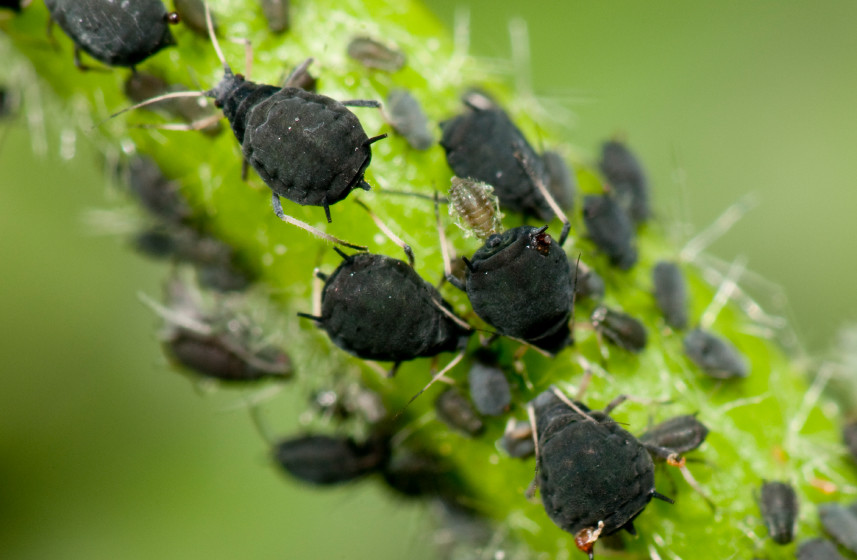
Of the over four thousand species of aphid known to exist, around 250 of those are considered harmful to crops.
Also known as green flies or plant lice, aphids are among the most prominent and successful garden pests worldwide.
These tiny insects pierce the stems of plants – preferring tender new growth to established greenery – in order to suck out the nutrient-rich sap, thus depriving the plant of the fuel that it needs to thrive.
Aphids also frequently carry viruses which infect a host plant as the insect feeds. Such viruses are often lethal to crops like potatoes, citrus fruits, and grains.
Furthermore, the honeydew secreted by aphids as they feed creates a favorable environment for sooty molds which spread quickly to coat the leaves of a plant, depriving it of sunlight.
While an aphid infestation may start out slow, aphids reproduce quickly and a colony of these pests can easily destroy entire crops if left untreated.
Fortunately, there are many ways to keep aphids in check using all natural and organic means that won’t compromise the health of your garden or your family.
1. Physical Removal
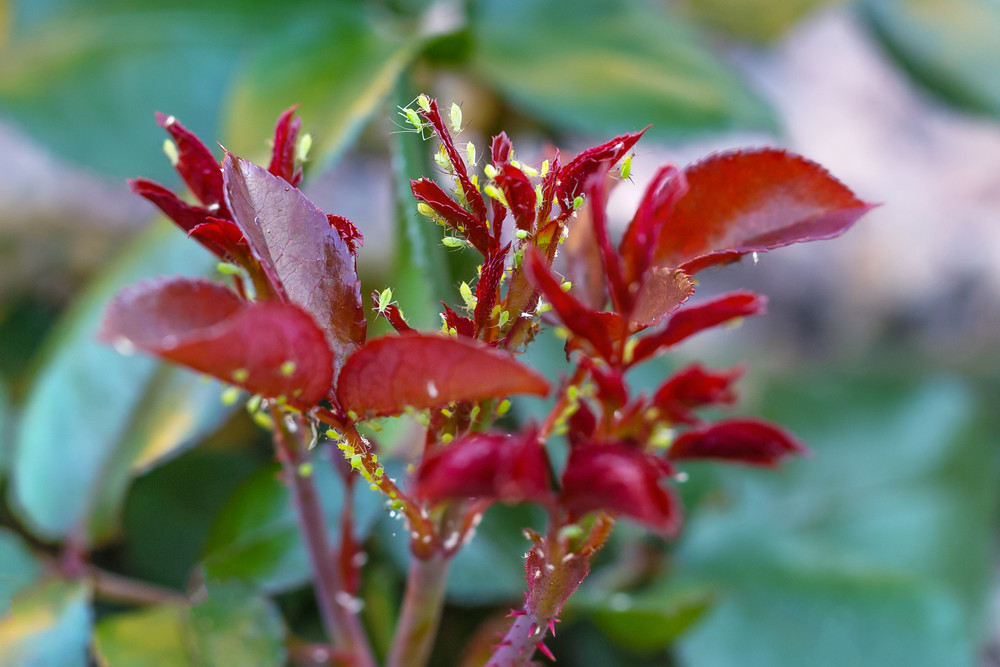
For minor infestations of aphids, it may be possible to physically remove the insects from your plants. Don a pair of gardening gloves and brush or pinch the pests from stems and leaves.
If the infestation is contained to one or two stalks or branches, prune off the affected portion(s) and drop them into a bucket of soapy water to kill the aphids.
2. Water Pressure
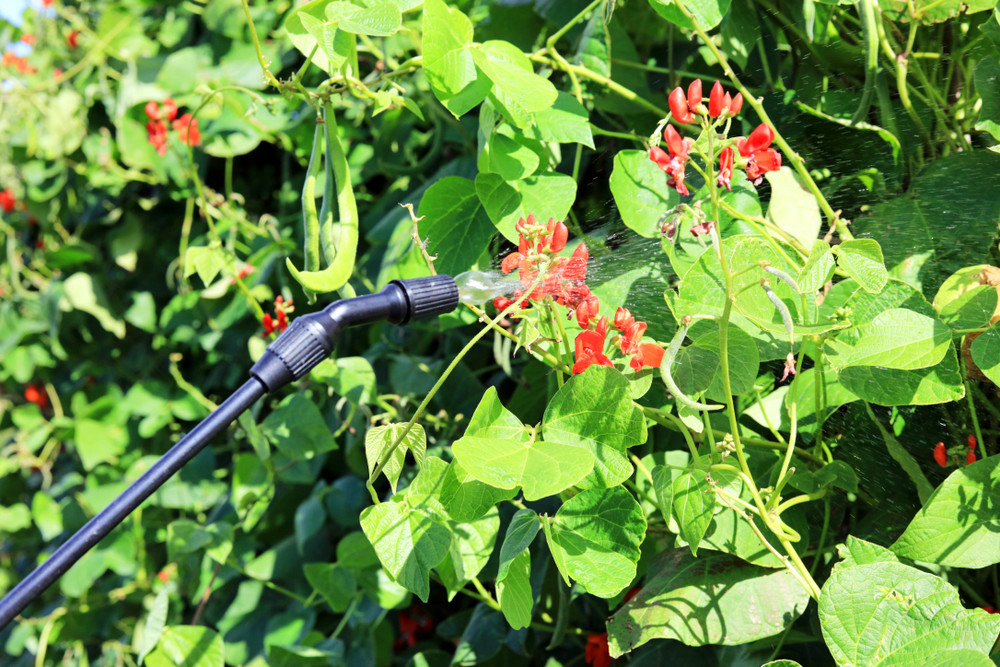
It is possible to spray aphids off of plants with the simple application of a garden hose.
While this method may harm younger, more fragile host plants, it can be quite effective at controlling small aphid populations on more robust and well-established plants.
3. Soap and Water
The basic nature of mild household detergents makes them perfect for getting rid of mild to moderate aphid infestations.
Dilute a few tablespoons of dish soap in a small bucket of lukewarm water and use a sponge or spray bottle to apply the mixture to plants where aphids have taken hold.
Upon contact, the soap will dissolve the waxy protective coating from aphids’ bodies, dehydrating and eventually killing the insects without harming the plant.
Remember to also treat the undersides of leaves where aphid eggs and larvae may be hiding!
***It is important to note that most forms of soap will also kill beneficial insects. Use caution when applying this treatment to your plants, as killing off populations of natural predator insects such as ladybugs, hoverflies, and lacewings will leave the door wide open for new colonies of aphids to move in.***
4. Neem Oil
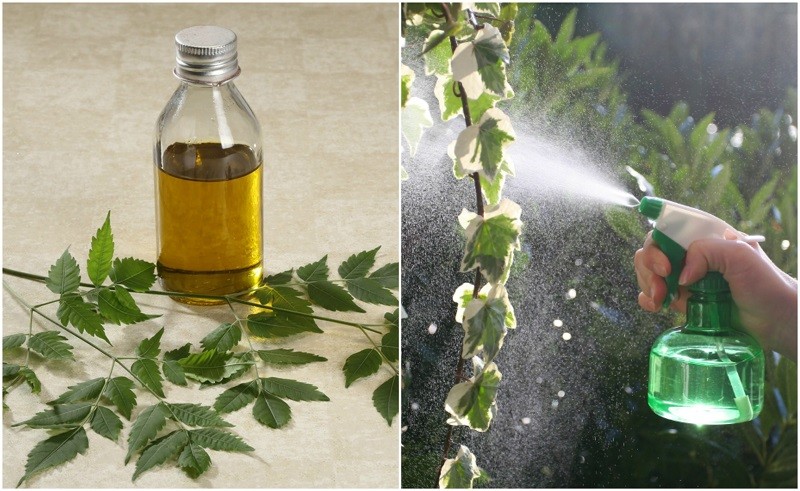
Used in much the same way as dish soap, organic and pure Neem oil may be diluted in water and sprayed onto plants infested with aphids.
The organic chemicals present in Neem oil act as a repellent against not only aphids, but also a wide array of other garden pests including mealy bugs, cabbage worms, beetles, leafminers, ants, and caterpillars.
Neem oil is also effective in controlling the spread of many types of fungus that infect plants among a number of other things.
***While Neem oil won’t necessarily kill beneficial insects, it may repel them from your garden. For this reason, apply this and any other form of insecticide or repellant with care.***
5. Essential Oils
Create a cocktail of equal parts thyme, peppermint, clove, and rosemary oils – 4-5 drops of each should suffice. Mix this solution into a small spray bottle filled with water. Shake well and apply to infested plants.
This potent mix of essential oils will kill most garden insect pests as well as their eggs and larvae. This combination also works great as a general purpose outdoor / indoor insect repellent!
Learn more about using essential oils in the garden in this great article.
6. Insecticidal Soap
There are many premixed all-natural insecticidal soaps treatments available for garden pest-control.
Always remember to read and follow the instructions provided with these products to avoid inadvertently harming any beneficial species of insect that may be present in your garden.
7. Beneficial Insects
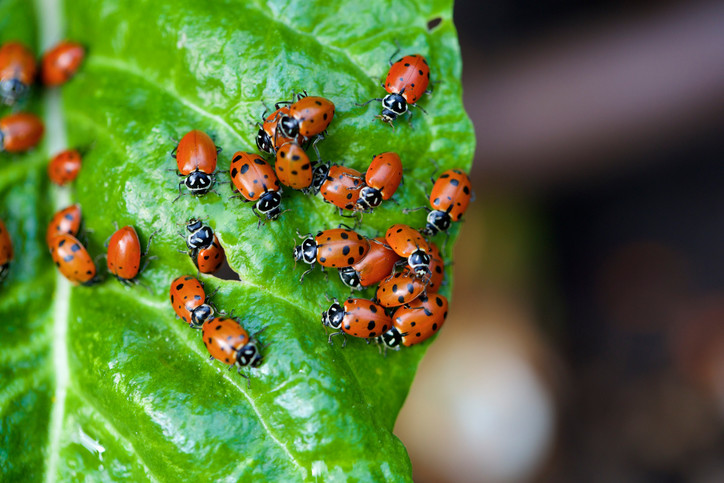
In some cases, it may be easier to introduce new or bolster existing populations of predator insects into areas infested with aphids.
The most well-known of these is the ladybird or ladybug beetle which may be purchased in bulk from most gardening and farming equipment suppliers, or even from Amazon.
There are also a number of ways to attract ladybugs to your garden. Here’s our article talking about the best ways to do that.
Also known for their appetite for aphids are hoverfly larvae and green lacewings.
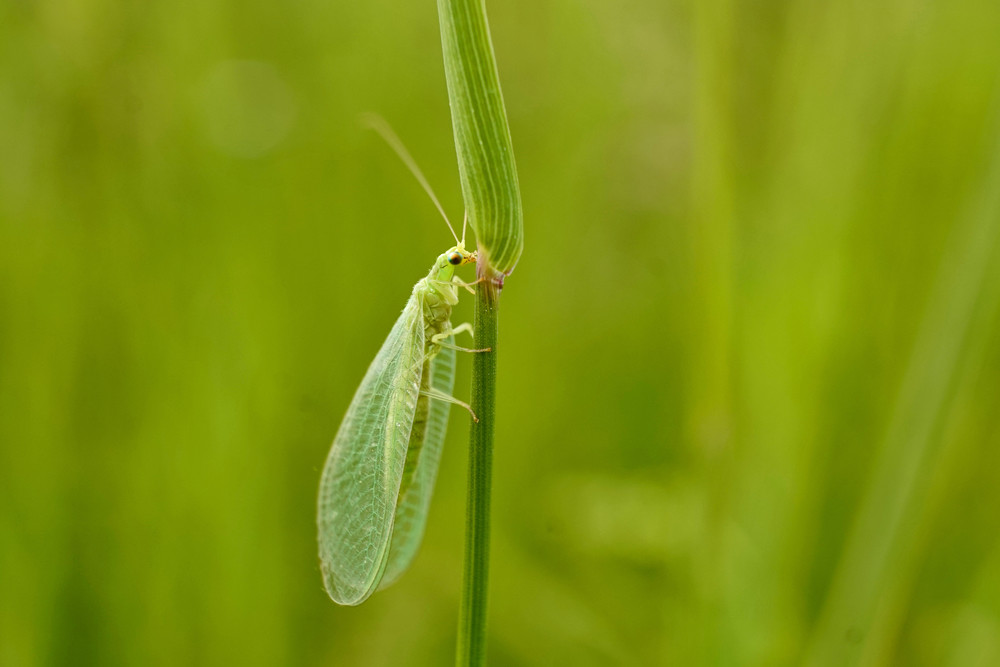
Lacewing eggs may also be purchased, however hoverflies will need to be drawn into your garden naturally.
Do this by planting fragrant herbs such as garlic, catnip, and oregano whose flowers attract these tiny predators.
You can also grow herbs like clover, mint, dill, fennel, and yarrow around your garden to naturally attract ladybugs and lacewings.
8. Bug-eating Birds

Another method for natural aphid control is to encourage the nesting of birds such as wrens, chickadees, and titmice around your garden.
The best way to attract these delightful aphid-devouring predators is to offer them free food and housing space.
These birds prefer to nest in small trees and twiggy shrubs that provide good cover.
Try planting hydrangeas, abelia, and other shrubs with dense foliage in which birds can hide from predators.
Evergreen bushes and trees like boxwoods, arborvitae, and privet are also excellent choices for attracting birds that prey on aphids.
Small birdhouses specifically designed for these species are another great option.
Also, while it may seem counter-productive, put out a feeder designed for small birds and fill it with seeds that attract small birds. Black oil sunflower seeds, pre-hulled sunflower seeds, nuts and nut hearts are all good choices. Birds who come for the seeds will most likely stay to dine on your aphids!
9. Watch Out for Ants
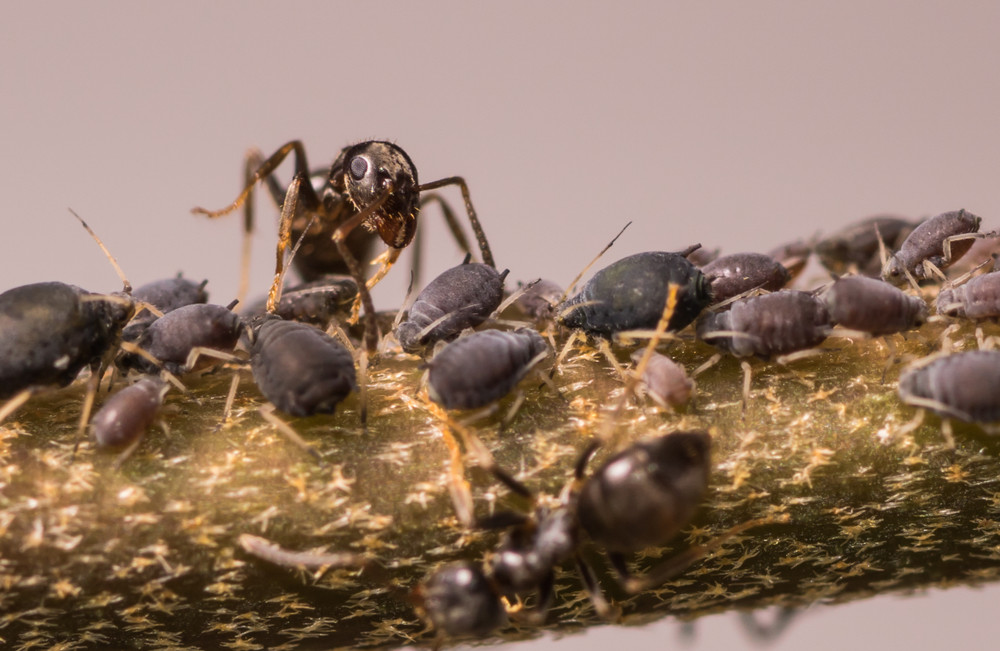
The honeydew secreted by feeding aphids is also a favorite food for many species of ants. As such, ants will often protect colonies of aphids from predators much like people protect their livestock.
Find a way to draw the ants away from their aphid-cattle such as by baiting them with small containers of honey placed near the base of the infested plant.
With the ants out of the way birds and predator insects will have better access to the aphids. Here are some more effective ways to get rid of ants.
10. Natural Repellents
Aphids dislike the organic compounds which give onions and garlic their signature aroma.
Grow these and other Alliums around your garden to discourage aphids from taking up residence there.
11. Natural Attractants
Conversely, you can select an area some distance away from the plants you wish to protect from aphids and plant some of these pests’ favorite foods there.
Zinnias, dahlias, cosmos, and asters are all appropriate peace offerings which aphids will happily infest in lieu of your precious garden.
Also, this will give the birds and predator insects a reason to stay in the vicinity (just in case the aphids decide to leave their designated area!)
12. Preserve the Balance
The solution to controlling aphid populations does not necessarily mean total annihilation of these pests from your garden.
Consider this: If there are no aphids to dine on, predators that naturally consume these insects will certainly fly away seeking more abundant food sources.
Instead of destroying every aphid in sight, make an effort to grow plants which are hardy enough to survive small populations of aphids.
Don’t over-fertilize, over-shelter, or otherwise baby your plants. This will allow them to grow up big and strong, fully capable of healing the small amount of damage caused by a modest number of sap-sucking insects.
Once you’ve achieved a balance between predators, prey, and host plants, you may never have to worry about over-population of aphids in your garden again.
Pin This To Save For Later
